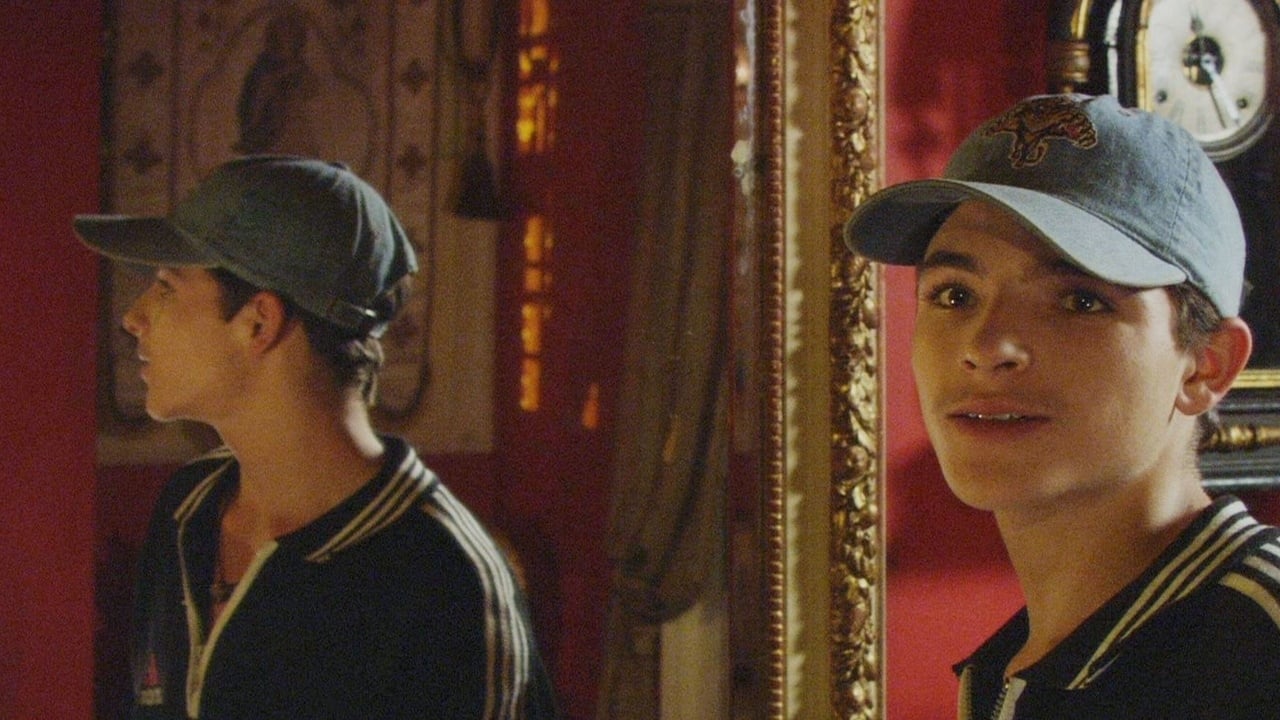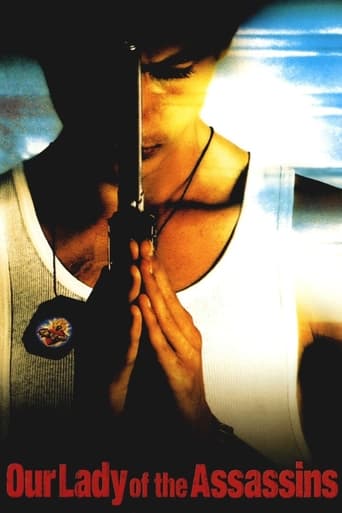

La Virgen de los Sicarios is a movie about 2 gays- a senior and a teenager (Alexis). Both live in a city where killing on streets is a daily routine. Alexis literally shots everybody who he wants to and only death stops him. Paradoxically, although he killed tenth of people, he could not have killed a sick dog. Because of the generational difference there are always 2 looks at one situation- the olds experienced look inwrought with memories and Alexis updated, who always knows what is happening. Unfortunately, the film does not know what he wants to say and becomes boredom, although there are some funny scenes and sudden turnovers. From the “sleep” wakes you nothing up.
... View Morethrough cinema we all find out that movies have as many motives and meanings as the different tastes everyone has. left alone the fact that this movie was done on a low budget i realized that the movie is not about the violence that plagued the city (medellin)in the 80's and early 90's. after living in the streets of medellin myself through all my childhood, i recognized that the movie was about the main character (fernando) realizing that he has been unhappy for all his life and apparently until it ends, he'll always be. he comes back 30 years later to his birthplace as a "famous writer" being politics his main specialty. just to find out out that his town has changed for worse. he's travelled all over the world and lived in the big cities abroad just to come back to put up with the ignorance and lowlife lifestyle of everyone around him. which is why he attracts all the bad situations that happen in this film. he tries to find love wherever he can find it, and he does so in alexis and then again with wilmar who kills alexis in revenge for having killed his brother and so many other gang members. after seeing all the common-everyday violence he finds useless to kill wilmar in revenge for killing alexis,and instead he emotionally attaches himself to wilmar. just to loose him as easy as he found him. this movie is about the sadness in being unhappy all your life. and the value of it.
... View MoreIn a way, I've been looking for a better "Breathless," for years. The original, the template, struck me as more of an essay on the emptiness of French film than anything else. It did create a narrative tone, but that tone required the absence of narrative structure. The story was that there was no story. It seemed possible for there to be something a bit more complex than a selfaware void and reference to American gangster films.We have that here. Its the same form: life has somehow locally had the plug pulled on purpose. A writer appears back home after a successful life at creating narrative and now discovers its all used up. He is prepared to die. The movie consists of several adventures with death, several dream-hallucinations that present a narrative of death (with a character that appears in "real" life and announces death), and a number of encounters with story in music and religion. Any of the encounters with death might be successful and the rest of the movie that during-death vision. Or any of it could be the author's writing of what happened before prompted by what happened before. Or it could all be post-death, which is to say post- writing. It still is all suspense and on the surface no movement, but the viewer moves as the narrative possibilities increase.Oh. He's gay and there's some folding of his character with a dead woman saint contained in the crypt of a certain church. So the "lady" is himself. In this world of coke, murder and perversion, no one smokes.Ted's Evaluation -- 2 of 3: Has some interesting elements.
... View MoreI was initially reluctant to watch this film on account of the gay theme, thinking it would be yet another film about melodramatic queens celebrating their life and love against the prejudices of an incomprehending world. But the homosexuality in this film, like the rest of this film's worldview, is the tough, violent unsentimental homosexuality of Genet (as the title hints) or of William S. Burroughs's Interzone, where rent boys, misanthropy, anarchy and random violence are just part of the wallpaper. As such, this move succeeds in making a movie of "The Naked Lunch" much more so than Cronenberg's effort, even though it wasn't trying to do so.Fernando, the late middle-aged pederastic writer, returns from Europe to his home town of Medellin after a long absence "to die" as he puts it, because he professes to be sick of life. His family has already died, and he has inherited their money and residences, allowing him to live a comfortable life but with nothing to live for. At a boy brothel he meets Alexis, a teenage gangster from the slums, and they start living together. The love is genuine, giving both of them something to live for, even though it a sugar daddy relationship.The pederastic relationship is nevertheless a very small part of the movie. It is primarily a device to bring together these two characters who are polar opposites of each other. The opera-loving Fernando is aging and cynical, looking back to his youth surrounded by his family in a peaceful, semi-rural pre-narcotraffic Medellin. Accompanied by Alexis, he revisits his childhood haunts of the old Medellin, and comments bitterly on how they've changed or disappeared. Fernando believes in nothing, and wanders the streets of Medellin spouting his nihilistic, misanthropic but humorous cynicism towards religion, politics, Colombians, the French, breeders, hypocrisy, bad manners and just about everything else, to the delight of his uneducated and taciturn young companion. But Fernando is a man of words rather than action.The hardrock-loving psychopath Alexis by contrast says little, but lives out the nihilism that Fernando merely verbalises. Alexis's large family is alive in the slums, but he doesn't see much of them. Alexis has an itchy trigger finger, and shoots anyone who incurs their displeasure for increasingly petty reasons, with increasing disregard for any possible consequences, least of all from the absent and ineffectual police. Fernando is at first appalled at seeing this callous disregard for human life actually carried out, but drawn by his love for Alexis, comes to accept and assist and even motivate this casual violence as part of the way of life in Medellin. Fernando even berates a woman for shrieking over one of Alexis's murder victims. Despite this, Alexis is religious. He blesses bullets with holy water and keeps bringing Fernando along to Medellin's numerous churches. Yet Alexis is unable to shoot an injured dog, and Fernando does so only reluctantly.The churches have a central place in this film. Despite the chaos and anarchy of the slums, the churches are still magnificent, clean and orderly. You never see priests or nuns at the churches, but there are plenty of junkies, vagrants, whores and gangsters sincerely praying and seeking redemption among the pews or lighting candles, but also hustling for drugs. One of the most visually memorable sequences in the film involves a dream sequence where the camera does a long sweep through one of the churches. Likewise the city and the malls are also clean and orderly, and the public transport system runs. Somehow a relatively normal, indeed sophisticated and orderly, life goes on amid the carnage and the slums. This was for me the most affecting aspect of the movie.The movie is shot on video using rather naturalistic lighting, giving the whole movie a clinically clean but raw feel. Although music is played on many occasions over radios and ghetto blasters and by live musicians, there is minimal background soundtrack music. The acting is sometimes not very good, but it is always restrained and unflowery. All of these factors give the movie a pseudo-documentary look which makes it easier to believe the sometimes implausible elements such as the readily-accepted pederasty, the anarchic violence and the junkie-filled churches.Although there is a plot, most of the movie is devoted to mood and setting rather than plot advancement. Fernando and Alexis (and after Alexis, Wilmar) wander about Medellin with Fernando declaiming everything, cross someone's path and get into an argument, Alexis shoots the arguer, they go to church, they go to Fernando's apartment and talk some more. This happens several times without going anywhere. Despite this, the film is never dull and maintains a cracking pace. I was riveted throughout. I'm not sure what the message of the movie is if there was one, but it was certainly memorable.
... View More